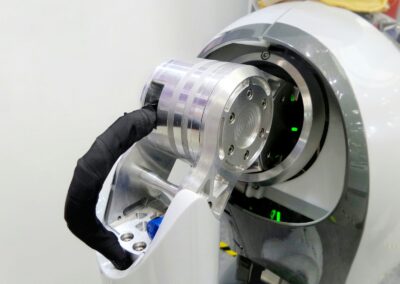Enhancing Personalized Support and Learning Outcomes
The Evolution of AI-Driven Tutors in Education
The use of AI-driven tutors and learning assistants in virtual classrooms provides personalized support and guidance for students, significantly improving learning outcomes. In the rapidly evolving educational landscape, regions like Saudi Arabia, the UAE, Riyadh, and Dubai are at the forefront of integrating advanced technologies to revolutionize the learning experience.
AI-driven tutors are designed to offer individualized attention to each student, adapting to their unique learning pace and style. These intelligent systems analyze student performance in real-time, identifying areas of strength and weakness. By tailoring educational content and activities to address specific needs, AI-driven tutors ensure that students receive the most effective and relevant support. This personalized approach is particularly beneficial in diverse and dynamic environments like Riyadh and Dubai, where educational institutions aim to cater to a wide range of student abilities and backgrounds.
Moreover, the implementation of AI in education extends beyond merely assisting with academic tasks. AI-driven learning assistants can provide emotional and motivational support, fostering a positive learning environment. These systems can identify signs of frustration or disengagement and offer encouragement and alternative strategies to keep students motivated. In the UAE and Saudi Arabia, where educational excellence is a top priority, the integration of AI-driven support systems can significantly enhance student engagement and success.
Benefits of AI-Driven Learning Assistants
The benefits of incorporating AI-driven learning assistants into virtual classrooms are multifaceted, ranging from improved academic performance to enhanced student well-being. These advantages make AI-driven systems an invaluable tool for modern education.
Firstly, AI-driven tutors enhance academic performance by providing targeted and efficient support. Traditional classroom settings often struggle to cater to the individual needs of each student, resulting in a one-size-fits-all approach. AI-driven learning assistants overcome this challenge by offering customized lessons and feedback. For example, in Dubai’s cutting-edge educational institutions, AI systems are used to create personalized learning paths, ensuring that each student can progress at their own pace and achieve their full potential.
Secondly, AI-driven learning assistants promote student well-being by reducing stress and anxiety associated with academic pressures. These systems offer a non-judgmental and supportive learning environment, allowing students to explore and learn without fear of failure. In regions like Riyadh, where educational stress can be a significant concern, AI-driven tutors can help create a more balanced and nurturing educational experience.
Additionally, AI-driven systems can provide valuable insights to educators, helping them identify trends and patterns in student performance. By analyzing data collected from AI-driven tutors, educators in Saudi Arabia and the UAE can develop more effective teaching strategies and interventions. This data-driven approach ensures that educational policies and practices are continuously refined to meet the evolving needs of students.
Challenges and Solutions for AI Integration in Education
While the benefits of AI-driven tutors and learning assistants are clear, integrating these technologies into the educational system poses several challenges. Addressing these challenges is crucial for ensuring that AI can be effectively utilized to enhance learning outcomes.
One significant challenge is the cost of implementing AI-driven systems. High-quality AI technology can be expensive, making it less accessible for some educational institutions. To overcome this barrier, governments and private sectors in regions like Saudi Arabia and the UAE can invest in developing cost-effective AI solutions and providing financial support to schools. By making AI technology more affordable and accessible, a broader range of students can benefit from these advanced educational tools.
Another challenge is ensuring the ethical use of AI in education. Concerns about data privacy and the potential for bias in AI algorithms must be addressed to build trust among students, parents, and educators. Establishing clear guidelines and regulations for AI use in education can help mitigate these concerns. In Riyadh and Dubai, where technological innovation is balanced with a strong emphasis on ethical standards, implementing robust regulatory frameworks can ensure that AI-driven systems are used responsibly and transparently.
Technical issues, such as the need for reliable internet connectivity and adequate digital infrastructure, can also hinder the integration of AI in education. Continuous investment in upgrading digital infrastructure and providing technical support is essential for the seamless operation of AI-driven learning assistants. In urban areas like Riyadh and Dubai, where digital infrastructure is rapidly developing, ensuring widespread access to high-speed internet and modern technology is crucial for maximizing the benefits of AI in education.
Leadership and Management in AI-Driven Education
Effective leadership and management are critical for the successful implementation of AI-driven tutors and learning assistants in virtual classrooms. Business leaders and educational administrators must prioritize innovation, user engagement, and ethical considerations to create a supportive environment for AI integration.
Executive coaching services in regions like Riyadh and Dubai are helping leaders develop the skills needed to manage AI-driven education initiatives effectively. These services offer tailored training programs focusing on leadership and management skills, equipping leaders with the tools to promote technological innovation and best practices in AI education. Leaders who are proactive in their approach can ensure that their organizations are well-prepared to harness the benefits of AI-driven learning while addressing its challenges.
Project management is another crucial aspect of promoting AI in education. Leaders must be adept at planning, executing, and evaluating AI integration projects, ensuring they align with organizational goals and industry standards. Executive coaching services in Saudi Arabia and the UAE provide leaders with the skills and techniques needed to manage these projects effectively. By prioritizing innovation and user engagement, leaders can build a robust framework that supports the successful integration of AI-driven tutors into their educational strategy.
Conclusion: Embracing AI for Future Education
In conclusion, the use of AI-driven tutors and learning assistants in virtual classrooms offers significant opportunities for personalized support and improved learning outcomes. By leveraging advanced technologies and prioritizing ethical considerations, educational institutions in Saudi Arabia, UAE, Riyadh, and Dubai can enhance the learning experience for students. Executive coaching services play a critical role in this process, equipping leaders with the skills and knowledge needed to navigate the complexities of AI integration. As the digital landscape continues to evolve, embracing AI-driven education will be essential for achieving long-term success and resilience in the educational sector.
—
#AIDrivenTutors #LearningAssistants #VirtualClassrooms #PersonalizedSupport #StudentOutcomes #SaudiArabia #UAE #Riyadh #Dubai #ArtificialIntelligence #Blockchain #ExecutiveCoaching #GenerativeAI #ModernTechnology #BusinessSuccess #LeadershipSkills #ProjectManagement























